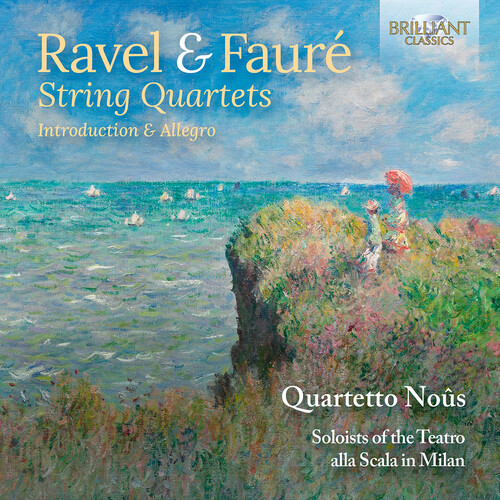Show results for
Deals
- 4K Ultra HD Sale
- Action Sale
- Alternative Rock Sale
- Anime sale
- Award Winners Sale
- Bear Family Sale
- Blu ray Sale
- Blues on Sale
- British Sale
- Classical Music Sale
- Comedy Music Sale
- Comedy Sale
- Country Sale
- Criterion Sale
- Cult Films sale
- Drama Sale
- Electronic Music sale
- Horror Sci fi Sale
- Jazz Sale
- Kids and Family Sale
- Metal Sale
- Music Video Sale
- Musicals on Sale
- Mystery Sale
- Naxos Label Sale
- Page to Screen Sale
- Paramount Sale
- Rap and Hip Hop Sale
- Reggae Sale
- Rock
- Rock and Pop Sale
- Rock Legends
- Soul Music Sale
- TV Sale
- Vinyl on Sale
- War Films and Westerns on Sale

Ravel & Faure: String Quartets
- Format: CD
- Release Date: 9/5/2025

Ravel & Faure: String Quartets
- Format: CD
- Release Date: 9/5/2025
- Composers: Gabriel Faure, Maurice Ravel
- Label: Brilliant Classics
- UPC: 5028421977461
- Item #: 2731063X
- Genre: Classical Artists
- Release Date: 9/5/2025
Product Notes
Maurice Ravel and Gabriel Faure each contributed a single string quartet to the chamber music repertoire, but both works are masterful reflections of their distinct musical voices and the broader evolution of French music in the early 20th century.
Ravel's String Quartet in F major, composed in 1903, stands as a defining work of French impressionism in music. Influenced by his teacher Faure and Debussy's quartet from 1893, Ravel's quartet is nevertheless strikingly original. The piece follows the traditional four-movement structure, but with bold harmonic language, refined orchestration for strings, and rhythmic innovation. The first movement is lyrical and elegant, while the second features pizzicato and dynamic contrasts that create a vibrant, almost playful texture. The third movement offers deep introspection, and the final movement reintroduces themes in a whirling, virtuosic conclusion. In contrast, Gabriel Faure's String Quartet in E minor, Op.121 is a late work, completed in 1924, shortly before his death. It was his only string quartet, and it reflects a more introspective, spiritual tone. Faure, already nearly deaf and physically weakened, poured into the music a sense of serenity and resignation. The three-movement structure (unusual for a quartet) avoids virtuosic display in favor of subtle textures and modal harmonies. The work unfolds slowly, with long, flowing lines and a remarkable economy of means, demonstrating his mature mastery of form and expression. Together, Ravel's and Faure's quartets represent two ends of a stylistic spectrum: Ravel's vibrant, youthful exploration of sound and structure contrasts with Faure's meditative farewell. Both works, however, reveal the expressive depth and refinement that define French chamber music at it's finest. As an important and substantial bonus to this recording we hear Ravel's Introduction & Allegro for flute, harp, clarinet and string quartet, a highly original and attractive work. Played by the Quartetto Nous, the Italian string quartet also engaged in the recording of the complete Shostakovich string quartets for Brilliant Classics, to great critical acclaim.

